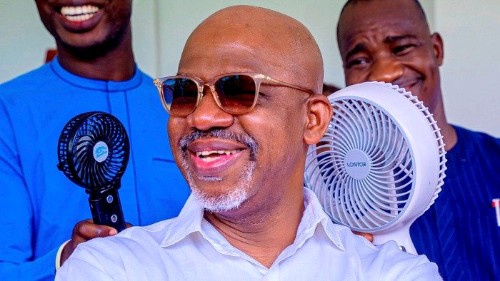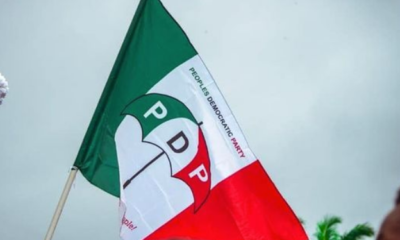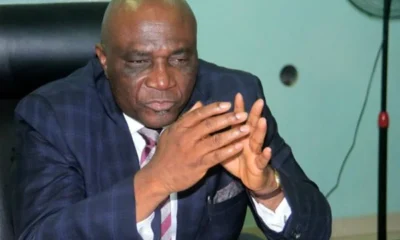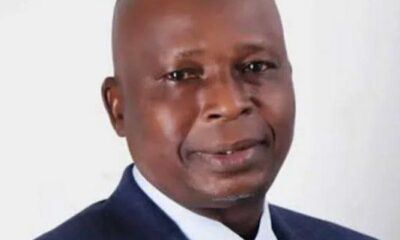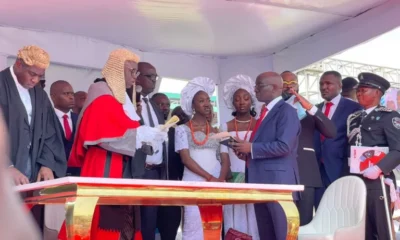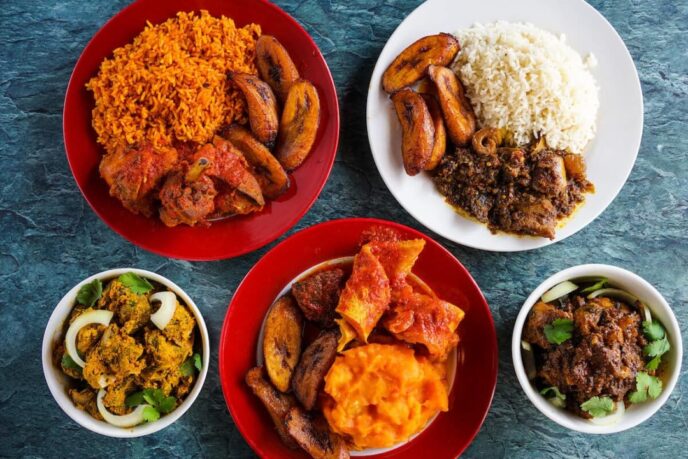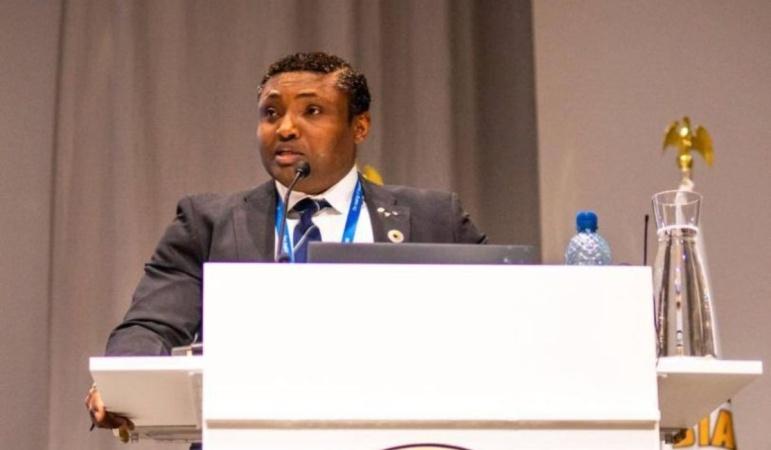The Federal Government will likely apply for the extradition of Simon Ekpa, the leader of the Eastern Security Network, the paramilitary organization of the Indigenous People of Biafra.
The Director of Defence Information, Brig Gen Tukur Gusau, who gave the indication on Thursday, said Ekpa, a self-proclaimed disciple of IPOB leader, Nnamdi Kanu, should be extradited to Nigeria to face criminal charges.
Also, many Nigerians online demanded his repatriation to Nigeria to face terrorism charges.
However, the IPOB dissociated itself from the embattled Biafran separatist, asserting it had no relationship with him.
Ekpa is one of the 97 individuals declared wanted by the Defence Headquarters in March 2024.
The Finland-based Biafran agitator is a close ally of the IPOB leader, Nnamdi Kanu, who is facing charges of terrorism, treasonable felony, and inciting violence through his Radio Biafra, amongst others.
He has been in the custody of the Department of State Services since 2021 when he was arrested in Kenya and brought back to Nigeria.
A presidential spokesman, Daniel Bwala, said President Bola Tinubu and the National Security Adviser, Nuhu Ribadu, have yet to be briefed on the arrest of Ekpa.
“The procedure is that the (Nigerian) Embassy in Finland has to have the information and it would brief the Ministry of Foreign Affairs and the minister might brief the NSA or the President,’’ he explained.
Ekpa and four others were arrested in Finland on charges related to terrorism, Finland’s Central Criminal Police said in a statement on Thursday.
A report said the District Court of Päijät-Häme, Finland, ordered that Ekpa be imprisoned “with probable cause on suspicion of public incitement to commit a crime with terrorist intent.”
Speaking on the development in a statement on Thursday, Gusau said the Chief of Defence Staff, Gen Chris Musa, was pleased with the trial of the ESN leader.
Gusau wrote, “CDS is happy with his arrest in Finland, with the hope this will be a step towards his extradition to Nigeria so that he will face justice.”
Ekpa, a Finnish citizen of Nigerian origin, was accused of inciting crimes with terrorist intent, while the other suspects face charges of financing terrorism.
He was arrested in February 2023 for his inciting comments and sit-at-home orders to the people of the South-East.
Before his arrest, thousands of Nigerians worldwide signed a petition appealing to the Finnish and Nigerian governments and the European Union to arrest Ekpa.
He had asked the people to boycott the 2023 general poll, insisting there would be no election in the region.
Worried by his activities, the Ministry of Foreign Affairs summoned the Finnish Ambassador to Nigeria, Leena Pylvanainen, over his threats to stop the 2023 general election in the South-East.
The ministry sought the Finnish government’s cooperation to arrest Ekpa over threats to disrupt the exercise.
The Finnish police confirmed on Thursday that Ekpa and his accomplices were arrested earlier this week as part of an international investigation.
Ekpa, who describes himself as the “Prime Minister” of the Biafra Republic Government-in-Exile, is alleged to have used social media platforms to promote violent activities in the South-East, including attacks on civilians and authorities.
The police said the main suspect was arrested “on suspicion of public incitement to commit a crime with terrorist intent,” while four others were arrested “for financing a terrorist crime.”
The police added: “Claims will be heard in Päijät-Häme district court today, November 21. The detention demands are related to the preliminary investigation, in which a Finnish citizen of Nigerian background, born in the 1980s, is suspected of public incitement to commit a crime with terrorist intent.
“The police suspect that the man has promoted his efforts from Finland by means that have led to violence against civilians and authorities as well as other crimes in the region of South-Eastern Nigeria” the statement read in part.
Speaking on the case, Crime Commissioner Otto Hiltunen stated, “The man has carried out this activity, among other things, on his social media channels,” suggesting that his online actions have fueled violence in Nigeria.
“Four other persons are suspected of financing the aforementioned activity. All five suspects in the crime were arrested at the beginning of the week.
“International cooperation has been carried out during the preliminary investigation,” the statement added.
The four other suspects, whose identities have not been disclosed, are believed to have financed these alleged activities.
The Central Criminal Police revealed that the case involved extensive international collaboration.
The Finnish authorities emphasised their commitment to investigating the case thoroughly as part of their broader effort to combat terrorism.
Expressing delight over Ekpa’s arrest and ongoing trial, the Director of Defence Media Operations, Maj. Gen Edward Buba, said the military was pleased with the news.
The Chief of Defence Staff had severally called for Ekpa’s arrest, accusing him of sponsoring terrorism in the South-East.
Buba noted that the military was glad that the international community was supporting the country in its fight against terrorism.
He stated, “The CDS has always called for the arrest of Simon Ekpa following his deep involvement in fuelling terrorism in SE Nigeria. We are delighted about his arrest, and glad that the international community is partnering with Nigeria in our fight against terrorism.”
The ESN has been implicated in numerous violent activities in the South-East since its creation in December 2020.
While the ESN was initially formed to counter the activities of armed herdsmen and protect local communities, their operations have reportedly led to significant unrest in the region.
The group has been accused of ambushing and killing troops of the Nigerian Army, police, and other security personnel.
Police stations and military checkpoints in the South-East have been frequent targets, leading to loss of lives and property.
Also, the ESN has been linked to arson attacks on public facilities such as police stations, electoral offices, and government buildings, disrupting governance and public services in the region.
There have been allegations of extrajudicial killings by the ESN, including attacks on individuals accused of opposing IPOB’s secessionist agenda or cooperating with the government.
Some communities have reported being harassed or forced to comply with the group’s directives, including its Monday sit-at-home orders, especially during days commemorating Biafra or protesting the detention of IPOB leader, Nnamdi Kanu.
Defiance of these orders had led to attacks on businesses, vehicles, and individuals, paralyzing economic activities in the South-East.
Conflicts between the ESN and local vigilante groups, including state-backed security outfits like Ebube Agu, have resulted in casualties and instability, escalating insecurity in the South-East.
The situation had led to heightened military operations in the region, sometimes resulting in collateral damage and further alienation of local communities.
The Federal Government labelled the ESN a terrorist organisation and launched several military operations to dismantle it.
On Monday, Anambra Central Senatorial Zone descended into chaos as gunmen enforcing the sit-at-home order attacked Abatete, Abagana, and Ukpo communities, leaving five people dead and several others injured.
At Abatete, three vigilantes attached to the town’s president-general were fatally shot. The victim sustained critical injuries and was rushed to a nearby hospital.
Also, vehicles were set ablaze by the attackers who repeatedly warned the people to respect the sit-at-home order.
Witnesses reported further violence in Abagana and Ukpo. At the Ukpo roundabout in Dunukofia Local Government Area, a vigilante member and a motorcyclist were reportedly gunned down.
Meanwhile, IPOB denied any relationship with Ekpa, saying it had publicly asked the people and relevant authorities to stop linking it with the embattled Biafran agitator.
Reacting to the arrest of Ekpa by the Finnish authorities, IPOB spokesman, Emma Powerful, maintained that his organisation had nothing to do with Ekpa and his group, Autopilot.
He said, “We are not interested in his arrest. All we want is for the release of our leader, Mazi Nnamdi Kanu, who has not committed any offence and who has been freed by the law courts. That is our concern.
“We have reiterated on several occasions that the Ekpa had no relationship with the IPOB from the formation to date and he had nothing in common with the Biafra struggle.
“For a long time, IPOB has maintained that there is nothing like autopilot in IPOB. More so, the criminal gang leader in Finland has no relationship with ESN from the formation of ESN to date or with IPOB. The authorities should stop linking IPOB with Ekpa and his group and IPOB is not interested in his arrest or whatever.”
“All we want is for the Nigerian government to release our leader who has been detained for no known crime other than fighting for the liberation of his people.”
Spokesman of IPOB’s Political Wing, Nwachukwu Emereonye, called for the immediate extradition of Ekpa to Nigeria to face the consequences of his actions.
While speaking to journalists on the development, Emereonye noted that Ekpa’s actions led to the death of scores of innocent people and destruction of businesses in the South-East.
He said, “We in IPOB Political Wing welcome the arrest of Simon Ekpa. His actions are unbecoming. Scores of people have been killed and properties worth billions of Naira destroyed.
“He should be handed over the Nigerian government for immediate prosecution.”
Credit: The Punch

 BIG STORY3 days ago
BIG STORY3 days ago
 BIG STORY3 days ago
BIG STORY3 days ago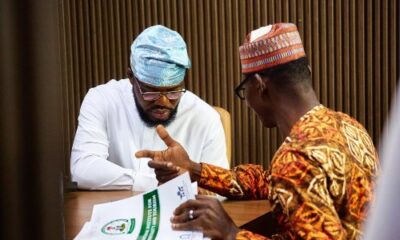
 BIG STORY3 days ago
BIG STORY3 days ago
 BIG STORY2 days ago
BIG STORY2 days ago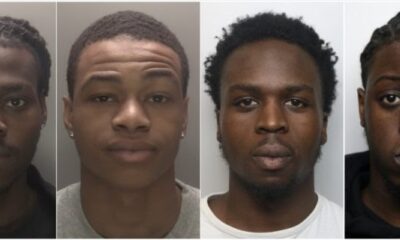
 BIG STORY4 days ago
BIG STORY4 days ago
 BIG STORY3 days ago
BIG STORY3 days ago
 BIG STORY4 days ago
BIG STORY4 days ago
 BIG STORY5 days ago
BIG STORY5 days ago




